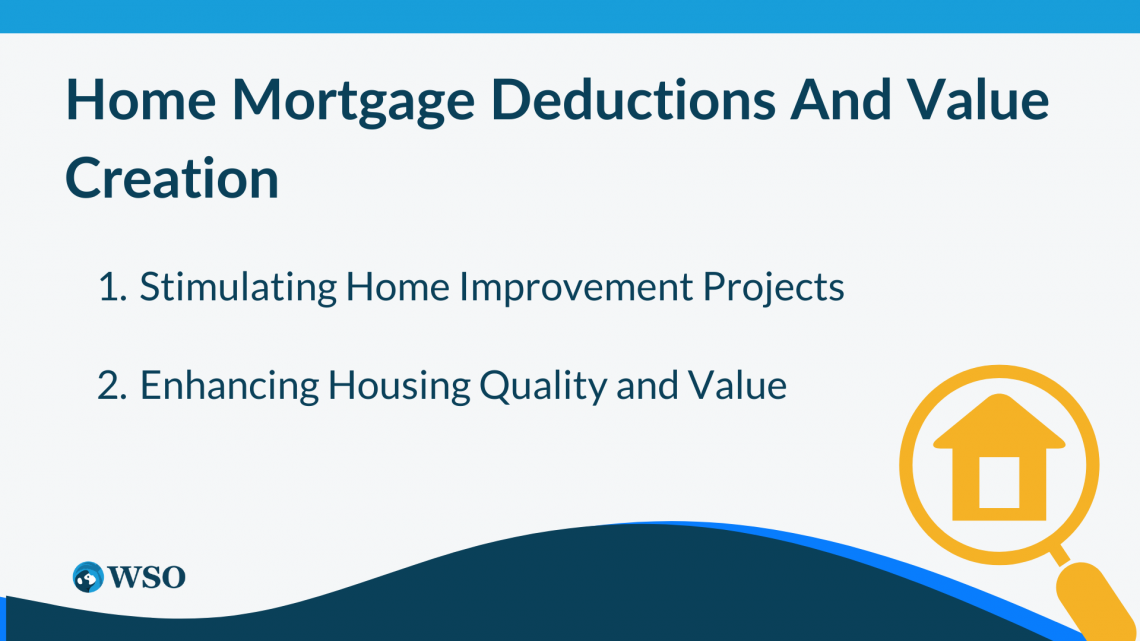Home Mortgage Interest Deduction
It is a tax provision that enhances affordability and promotes homeownership.
What Is a Home Mortgage Interest Deduction?
A home mortgage interest deduction is a tax deduction that homeowners in some countries can claim on their annual tax returns. This deduction allows homeowners to reduce their taxable income by the amount of interest paid on their mortgage during the tax year.

Today, we shall seek to explore and shed light on the advantages of individuals who can benefit from such deductions by highlighting their significance in promoting financial well-being and supporting home ownership dreams.
By reducing taxable income, homeowners effectively reduce their tax liability. This, in turn, allows them to allocate saved funds towards essential expenses or future savings.
The financial flexibility provided by this deduction proves valuable for aspiring homeowners, as it helps them gather a down payment, qualify for a mortgage, and turn their dreams of homeownership into reality.
By making homeownership more financially feasible and appealing, this deduction motivates potential buyers to explore the possibilities of owning a home.
The impact of the Home Mortgage Interest Deduction extends beyond individual homeowners. A strong housing market is crucial for overall economic stability, and this deduction is vital in achieving that.

It is worth noting that the deduction has been the subject of policy discussions and debates. Governments recognize its potential to drive economic growth and support homeownership, occasionally leading to adjustments and modifications.
Staying informed about the details of this deduction and any changes in its application is essential for homeowners and prospective buyers.
We will examine how it enhances affordability, fosters homeownership opportunities, stimulates economic activity, encourages wealth accumulation, and incentivizes housing investment and renovation.
Through exploring these aspects, readers will gain a comprehensive understanding of the significance and advantages associated with this tax provision.
Key Takeaways
- Increased affordability and homeownership opportunities: by reducing taxable income, the deduction provides financial relief, enabling individuals to save for down payments, qualify for mortgages, and potentially fulfill their homeownership dreams.
- Lower tax liability and increased disposable income: the deduction plays a vital role in making homeownership attainable by reducing the tax burden on homeowners. This allows them to allocate funds towards essential expenses or savings.
- Stimulated economic growth and real estate market: the deduction incentivizes homeownership, which leads to increased demand for homes, the creation of jobs in the construction sector, and the stabilization of the economy.
- Encouragement of housing investment and renovation: by making mortgage interest tax-deductible, the deduction encourages individuals to invest and improve their properties, driving economic activity and enhancing the value of housing stock.
- Long-term wealth accumulation: the deduction allows homeowners to build equity and accumulate wealth over time as mortgage balances fall and property values appreciate.
Greater Homeownership With Home Mortgage Deductions
The Home Mortgage Interest Deduction is a tax provision that enhances affordability and promotes homeownership.

Lowering Tax Liability and Increasing Disposable Income
Imagine a homeowner who pays $12,000 in mortgage interest annually. Should the salary of this individual fall within the 25% tax bracket, the deduction will save them $3,000 in taxes.
These savings can be significant and have a positive effect on their financial situation.
With an additional $3,000 in their pocket, homeowners have the flexibility to allocate funds toward other essential expenses or savings. They may choose to invest in home improvements, enhancing the value and comfort of their property.
By reducing the tax burden and increasing disposable income, the Home Mortgage Interest Deduction contributes to expanding homeownership opportunities.
The Home Mortgage Interest Deduction enables individuals and families to make prudent financial choices, invest in their properties, and enhance their overall financial well-being.
Note
The provision fosters stability, wealth accumulation, and a stronger sense of community through increased homeownership.
Accumulating Down Payment Funds
This tax provision plays an important role in making homeownership more attainable by reducing the financial burdens associated with mortgage payments. Saving enough money for a down payment can significantly challenge potential homebuyers.
However, the Home Mortgage Interest Deduction plays a vital role in addressing this obstacle by providing homeowners with additional financial resources to accumulate the necessary funds.
Let us consider a hypothetical scenario of a young couple aiming to purchase their first home. With the Home Mortgage Interest Deduction, they have the opportunity to save a portion of their taxable income, gradually building their down payment fund.
Note
The deduction incentivizes them to set aside a portion of their earnings specifically for homeownership.
Over time, the cumulative impact of the deduction can be substantial. The couple can leverage the tax savings from their mortgage interest deduction and allocate those funds towards their down payment goal.
By consistently saving and taking advantage of this deduction, they can steadily accumulate the necessary funds to make their dream of homeownership a reality.
The Home Mortgage Interest Deduction reduces homeowners' tax burden and assists them in accumulating down payment funds. It serves as a financial tool that incentivizes individuals and families to save strategically, paving the way for increased homeownership opportunities.
Note
By providing these additional financial resources, the deduction plays a crucial role in helping potential homebuyers overcome one of the significant hurdles on the path to owning a home.
Qualifying for Mortgages and Favorable Loan Terms
With the deduction's assistance, the potential homebuyer may be able to demonstrate a greater ability to manage monthly mortgage payments effectively.
The Home Mortgage Interest Deduction not only enhances affordability. But also plays a crucial role in increasing homeowners' eligibility for mortgages and securing favorable loan terms.
Let us consider a hypothetical scenario where a potential homebuyer's monthly budget is limited by their tax liability. This increased financial flexibility enables them to meet the qualification criteria set by lenders when applying for a mortgage.
Note
By securing a mortgage with favorable terms, the potential homebuyer's path to homeownership becomes more feasible and financially sustainable.
The reduction in tax liability provided by the deduction empowers individuals and families to navigate the mortgage qualification process with greater ease, opening doors to homeownership that may have otherwise been out of reach.
The Home Mortgage Interest Deduction not only increases affordability but also enhances homeowners' eligibility for mortgages.
By utilizing the deduction to reduce their tax burden, potential homebuyers can position themselves favorably in the mortgage application process, potentially securing more favorable loan terms and making their homeownership goals more attainable.
Stimulating Economic Growth and Real Estate Market
The Home Mortgage Interest Deduction plays a vital role in stimulating economic growth and bolstering the real estate market.
By incentivizing homeownership, this deduction encourages real estate investments and boosts construction activities, leading to a ripple effect across related industries.
Note
In a recovering economy, the deduction can ignite housing demand.
As affordability entices prospective homebuyers with its benefits, the real estate market experiences a surge in transactions, triggering growth in construction, home improvement, and other sectors.
The advantages provided by the deduction have a far-reaching impact, benefiting homeowners and promoting homeownership. By reducing tax liability it enhances affordability, allowing individuals and families to allocate their resources toward savings for down payments.
This, in turn, increases their prospects of qualifying for favorable mortgage terms, making the dream of homeownership more attainable.
Note
The economic growth spurred by the Home Mortgage Interest Deduction contributes to job creation as construction and related industries experience increased demand.
The resulting rise in employment opportunities not only strengthens individual financial well-being but also leads to higher consumer spending, further driving economic expansion.
The Home Mortgage Interest Deduction serves as a catalyst for economic growth, job creation, and a thriving real estate market.
By supporting homeownership, it creates a positive cycle of wealth accumulation, stability, and community development, ultimately benefiting individuals, families, and the broader economy.
Note
Its significance cannot be overstated in enabling individuals and families to achieve their homeownership dreams while contributing to a robust housing market and a flourishing economy.
Home Mortgage Deductions And Further Economic Stability
The Home Mortgage Interest Deduction positively impacts the economy by fueling growth in the housing market.

Incentivizing real estate investments generates increased demand for homes, stimulates job creation in the construction sector, and contributes to overall economic stability.
Encouraging Real Estate Investments
The Home Mortgage Interest Deduction serves as a powerful incentive for individuals to engage in real estate investments.
By providing potential financial relief, it encourages hesitant buyers to enter the housing market, leading to increased sales and promoting overall investments in properties.
For instance, imagine a prospective homebuyer who has been considering purchasing a property but is unsure due to financial concerns. However, upon learning about the benefits of the Home Mortgage Interest Deduction, they realize the potential financial relief it can provide.
This newfound awareness might act as a catalyst in motivating them to take the leap and invest in a property they would not have under normal circumstances.
Increased investments contribute to a vibrant real estate sector, whose various business activities stimulate economic growth.
Moreover, as more individuals participate in real estate investments, it creates a positive cycle that attracts further interest from potential buyers and investors.
Note
The Home Mortgage Interest Deduction plays a significant role in encouraging individuals to make real estate investments, promoting a thriving housing market.
Increased Demand for Homes
The Home Mortgage Interest Deduction creates a ripple effect in the housing market by stimulating increased demand for homes.
For instance, in regions where the Home Mortgage Interest Deduction is in effect, there is often a noticeable uptick in housing market activity. Prospective homebuyers, spurred by the financial advantages offered by the deduction, actively seek opportunities to purchase homes.
This heightened demand creates a robust market with increased transaction volumes, benefiting sellers and supporting the growth and stability of the overall housing market.
The increased demand for homes driven by the Home Mortgage Interest Deduction has several positive implications.
First, it leads to a more competitive market, which provides sellers the advantage of attracting multiple offers and the opportunity to secure higher selling prices.
An additional benefit lies in fostering a sense of confidence among homeowners, knowing that there is a healthy pool of potential buyers in the market.
Note
The stability further encourages homeowners to invest in their properties, making improvements and upgrades that contribute to the overall quality of the housing stock.
Job Creation in the Construction Sector
The Home Mortgage Interest Deduction not only influences the housing market but also plays a vital role in job creation, particularly in the construction sector.
As the demand for homes rises due to the benefits of the deduction, it stimulates the need for new construction and home improvement projects, resulting in increased employment opportunities in the construction industry.
For instance, in regions where the deduction is in effect, construction companies experience a significant surge in demand for their services. These professionals are essential in fulfilling the growing demand for new homes and renovations.
This stimulation in construction activity leads to the creation of jobs, providing employment opportunities and supporting economic prosperity in the broader community.
Note
The job creation impact of the Home Mortgage Interest Deduction goes beyond the construction industry itself. It also extends to various related sectors, including building material suppliers, manufacturers, real estate agents, and home service providers.
Contributing to Economic Stability
The transformative influence of the Home Mortgage Interest Deduction extends well beyond the housing market, particularly in relation to job creation within the construction sector.
As demand for residential properties surges, it sets in motion a chain reaction of new construction and home improvement projects, leading to substantial employment opportunities in the construction industry.
For instance, in regions where the deduction is in effect, construction companies experience an unprecedented surge in demand for their services.
Note
This requires the hiring of skilled workers in various roles that extend beyond construction workers, contractors, and subcontractors.
This job creation effect ripples throughout the construction sector, benefiting associated industries like building material suppliers, manufacturers, real estate agents, and home service providers.
The impact of job creation in the construction sector extends beyond the immediate economic benefits. With more individuals gaining employment in construction, their increased income stimulates consumer spending, driving economic growth in other sectors of the economy.
The multiplier effect generated by the additional spending further contributes to the overall economic well-being of the community.
Note
This deduction plays a vital role in fostering a thriving housing market and a robust economy by contributing to economic growth and stability.
Wealth Accumulation Through Home Mortgage Interest Deductions
The Home Mortgage Interest Deduction serves as a powerful incentive for aspiring homeowners, making homeownership more accessible and affordable.

Building Equity and Net Worth
Homeownership serves as a powerful means of building equity and increasing net worth, offering homeowners the potential to create substantial wealth over time. This equity represents the portion of the property's value that the homeowner truly owns.
Over the course of several years, the impact of building equity becomes evident. Let us consider a hypothetical couple who has owned their home for a decade and diligently made regular mortgage payments.
During this period, they have steadily reduced their mortgage balance, consequently writing down their debt burden and increasing their ownership stake in the property.
Furthermore, if the housing market has experienced appreciation, the value of their home may have also risen over the years. The combination of reduced debt and increased property value significantly contributes to their overall net worth.
Note
The appreciation in their home's market value serves as an additional source of wealth accumulation for the homeowners.
Homeowners have the option to tap into their accumulated equity through various means that include refinancing, home equity loans, or selling of property.
These avenues enable homeowners to access funds for other investments, educational expenses, or unforeseen circumstances.
Note
By reducing tax liability and increasing disposable income, this provision allows homeowners to allocate more funds toward paying down their mortgage principal. As a result, they can expedite the process of building equity and enhancing their net worth.
Tax Savings and Long-Term Benefits
The Home Mortgage Interest Deduction not only provides homeowners with the benefit of tax savings but also offers long-term advantages that contribute to wealth accumulation and financial stability.
By reducing the taxable income, this deduction leads to substantial tax savings for homeowners. These tax savings present homeowners with additional financial resources that can be utilized in various ways.
One significant advantage of the tax savings is the ability to reinvest the funds. Homeowners can allocate the saved money towards home improvements, renovations, or upgrades, which can enhance the value of their property.
These funds can provide financial flexibility and relieve some of the financial burdens that homeowners may face.
Furthermore, the tax savings can be channeled towards savings and investments. Homeowners can establish or contribute to their emergency funds, retirement accounts, or other investment vehicles.
Note
By prioritizing savings and investments, homeowners can create a solid financial foundation and potentially generate additional income and wealth over time.
As the savings grow and compound, homeowners can work towards achieving their financial goals, such as early retirement, purchasing additional properties, or leaving a legacy for future generations.
Whether through reinvesting the savings, directing them towards other expenses, or channeling them into savings and investments, homeowners can leverage the financial advantages of this deduction to enhance their long-term financial stability and prosperity.
Note
As homeowners make mortgage payments and build equity, they simultaneously lay the foundation for financial stability and long-term wealth accumulation.
Home Mortgage Deductions And Value Creation
The Home Mortgage Interest Deduction not only benefits homeowners but also incentivizes investment in housing and home improvement projects.

By making mortgage interest tax-deductible, individuals are encouraged to invest in their properties, increasing their value and enhancing the overall quality of housing stock.
Stimulating Home Improvement Projects
The Home Mortgage Interest Deduction also encourages homeowners to undertake renovation and improvement projects. By making the interest on loans taken for home renovations tax-deductible, homeowners are more likely to invest in enhancing their properties.
For example, when a homeowner considers taking on a renovation project, they can consider the potential tax benefits associated with the Home Mortgage Interest Deduction.
This deduction allows them to offset a portion of the interest expenses incurred during the renovation, making the investment more financially appealing.
By taking advantage of the deduction, homeowners can allocate more funds towards their renovation projects, which can range from kitchen upgrades and bathroom remodels to adding additional living space or improving energy efficiency.
Note
The improvements not only enhance the aesthetics and functionality of the property but can also potentially increase its market value.
With reductions in the overall cost of financing the project, homeowners have more financial flexibility to pursue their desired improvements and make their dream homes a reality.
Enhancing Housing Quality and Value
The availability of tax relief through the Home Mortgage Interest Deduction enables homeowners to enhance the quality and value of their homes.
By utilizing the savings on taxes, homeowners have the opportunity to allocate additional funds towards renovations, upgrades, and other improvement projects, leading to more attractive and valuable property.
For instance, consider a homeowner who decides to use the generated tax savings to upgrade their kitchen. Having additional resources enables them to invest in quality materials that could enhance the aesthetic appeal of their home.
Note
The upgrade not only enhances their daily living experience but also increases the overall value of their home.
By reinvesting the tax savings into their property, homeowners can address various aspects of their homes, such as bathroom renovations, landscaping enhancements, energy-efficient upgrades, or the addition of desirable amenities.
Moreover, by increasing the value of their properties, homeowners may also benefit from greater equity, allowing them to access favorable financing options or tap into their home's value for other financial needs.
Note
By making mortgage interest tax-deductible, it encourages individuals to invest in their homes, driving economic growth, improving housing quality, and creating opportunities for wealth accumulation.
Conclusion
The Home Mortgage Interest Deduction is a valuable tax provision that offers numerous benefits to homeowners and the broader economy. The deduction serves as a powerful incentive, making homeownership more accessible and attainable for many aspiring homeowners.

It encourages investment in real estate, leading to increased demand for homes, construction jobs, and related industries.
Furthermore, the deduction promotes long-term wealth accumulation. By reducing tax liabilities, homeowners can allocate more resources towards mortgage payments and build equity in their properties over time.
As mortgage balances decrease and property values appreciate, homeowners can witness substantial growth in their overall net worth. The deduction offers a pathway to financial security and the potential for significant wealth accumulation.

Additionally, the deduction incentivizes housing investment and renovation. By making mortgage interest tax-deductible, it encourages homeowners to invest in improving their properties, enhancing their quality and value.
As individuals navigate the complexities of homeownership, understanding and leveraging the Home Mortgage Interest Deduction can provide significant advantages in achieving their financial goals.









or Want to Sign up with your social account?